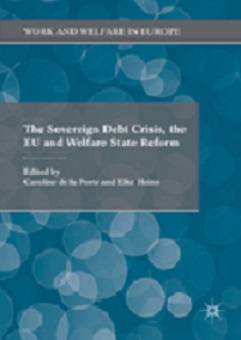Jones, Erik, Torres, Francisco, (2016), “Governance of the European Monetary Union: Recasting Political, Fiscal and Financial Integration”, Routledge, 7 June The crisis in the euro area is a defining moment in the history of European integration. It has revealed major flaws in the architecture of the European Union; it has challenged European institutions to shape an appropriate response; and it has tested the patience of a European public that is eager to …Read More
The Sovereign Debt Crisis, the EU and Welfare State Reform
De La Porte, Caroline, Heins, Elke, (2016), “The Sovereign Debt Crisis, the EU and Welfare State Reform”, Palgrave Macmillan UK This book offers a much-needed analysis of how the European Union (EU) has affected welfare state reforms in the Member States most severely hit by the 2008 economic crisis. Bringing together leading European social policy researchers, it shows that the EU’s responses to the sovereign debt crisis have changed the nature of EU …Read More
Europe and the people: Examining the EU’s democratic legitimacy
Hug, Adam, (2016), “Europe and the people: Examining the EU’s democratic legitimacy”, The Foreign Policy Centre, June The European Union finds itself at a critical juncture. The long-term political impacts of the 2008 economic crisis and the rising pressures of globalisation have helped to drive public distrust in traditional sources of influence and authority. As a supranational institution trying to bring together the disparate wills of 28 member state publics …Read More
EU experimentalist governance in times of crisis
Zeitlin, Jonathan, (2016), “EU experimentalist governance in times of crisis”, West European Politics, Volume 39, Issue 5, 9 June This paper analyses the evolution of EU governance since the financial and eurozone crisis from an experimentalist perspective. It argues that EU governance in many key policy domains continues to take the form of an experimentalist decision–making architecture, based on a recursive process of framework goal–setting and revision through comparative review of implementation experience …Read More
Europe’s union in crisis: tested and contested
Laffan, Brigid, (2016), “Europe’s union in crisis: tested and contested”, West European Politics, Volume 39, Issue 5, 20 June This special issue explores how Europe’s Union is tested though crises but also faces explicit contestation in troubled times. Crises are ‘open moments’ that impact on rulers and ruled, testing existing paradigms, policies, politics, institutional roles and rules. The papers in this special issue test the resilience of the Union in crisis conditions, the …Read More
Future of the EU27: What to expect from this summer’s period of reflection
Blockmans, Steven, (2016), “Future of the EU27: What to expect from this summer’s period of reflection”, Centre for European Policy Studies, 18 July As the UK’s brutal political fallout of Brexit continues to astound the world, leaders in the other member states are wrestling with the EU’s new reality. They deemed it too early to draw conclusions at the June European Council. Instead, the heads of state and government declared a …Read More
An inflection point in European Union studies?
Young, Alasdair R., (2016), “An inflection point in European Union studies?”, Journal of European Public Policy, 8 June This contribution introduces a selection of the best papers presented at the 2015 European Union Studies Association’s biennial conference. It uses these papers as a jumping off point to consider whether European Union (EU) studies suffers the same ‘gap’ with real-world problems that is seen to afflict some portions of the academy and to …Read More
How to solve Europe’s three biggest problems
David Folkerts-Landau (ed.), (2016), “How to solve Europe’s three biggest problems”, Konzept – Deutsche Bank Research, June In this issue we tackle three of the most intractable problems facing Europe today: moribund economic growth, the refugee crisis and a banking sector that struggles to satisfy anyone even eight years after the financial crisis. Our three feature articles show that credible solutions exist provided that governments, policymakers, investors as well as the public …Read More
From Summitry to EU Government: An Agenda Formation Perspective on the European Council
Carammia, Marcello, Princen, Sebastiaan, Timmermans, Arco, (2016), “From Summitry to EU Government: An Agenda Formation Perspective on the European Council”, Journal of Common Market Studies, Volume 54 Issue 4, Jule While some observers have claimed that the European Council has become the key institution in European Union politics, others have argued that the Council’s role has remained relatively stable over time. In this article, we argue that an analysis of agenda formation dynamics …Read More
Is the EU really run by unelected bureaucrats?
Hix, Simon, (2016), “Is the EU really run by unelected bureaucrats?”, LSE Europpblog, June Much of the UK’s referendum debate has focused on the extent to which EU decision-making is democratic, with the European Commission a source of particular criticism from leave campaigners on the basis that it is unelected. Simon Hix writes that while there are legitimate problems with the EU’s system of democracy, there is little to justify the …Read More






